We don’t live for society; we live for what’s inside of us! And Montgomery College Summer Dinner Theatre is living for what’s inside of them; an astonishing production of Little Women, the musical, based on the novel by Louisa May Alcott, with Book by Allen Knee, Music by Jason Howland, and Lyrics by Mindi Dickstein. Directed and Choreographed by Ashleigh King with Musical Direction by Marci Shegogue, this empowering tale of the four March sisters, as narrated by Jo and all of her worldly ideals, is quite the literary classic set to music.
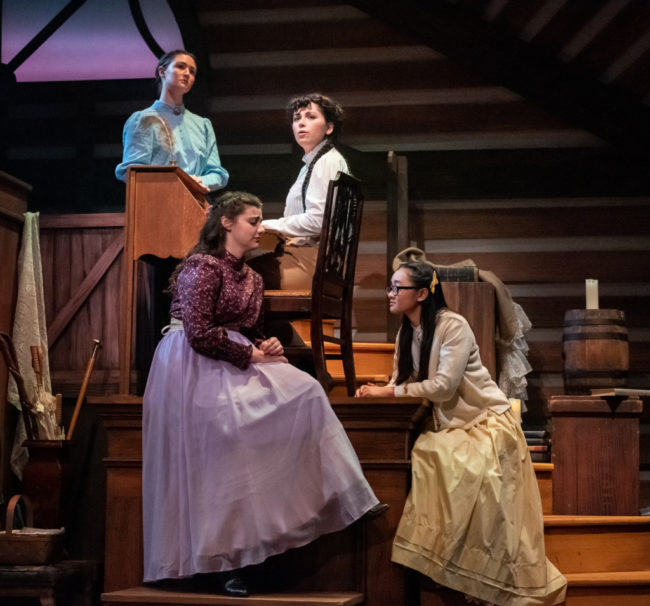
With a striking set that transports you straight to the March family attic, Scenic Designer Elizabeth Jenkins McFadden’s brilliance is a resplendent peripheral character that envelops the narrative as it unwinds. Properties Designer R. Scott Hengen works with McFadden to cultivate the look of many settings— the March family attic being the primary location, as well as their main room, the boarding house in New York City, and a few other places that exist only in the minds of Jo and her sisters— whilst perfectly balancing the spatial relationship of furniture to structural configuration to performer all across the stage. The set itself with its high arched wood beams is breathtaking. And the overall effect of such a striking set is enhanced by the pristine lighting design of Lynn Joslin, whose seasoned knowledge of how to light interior spaces in a subtle but effective manner are second to none. Joslin also adds some thrilling special effect lighting for things like sunrise and the ‘violence and seduction on every page’ scenes where Jo finds herself recounting one of her stories. Blending into this wondrous design work is the aural soundscape of Sound Designer Matthew Datcher, whose infusions of background noise (like at the St. Valentine’s Ball) and other useful sound effects, are well-met in response to the moments in which they live throughout the performance.
Costumer Designer Kristina Martin and her assistant Rhiley Sowers firmly ground the show’s sartorial selection in the center of the Civil War era. The high-waisted skirts and full sleeved shirts on the women, or Marmee’s matronly yet simplistic house frock have all the right colorings and shapes of clothing from that historical time. Jo’s very tomboy, bordering on too-masculine, pants are also perfect for the decidedly unfeminine character (as she tries to robustly break into the man’s world of fictional writing all throughout the performance.) The gowns that Martin and Sowers fabricate for the scene where Meg and Jo go off to the ball, the restrictive almost funerary ensemble featured on Aunt March in all her regality, and everything else between showcases Martin and Sowers’ understanding of the era and how to adeptly costume the show accordingly.
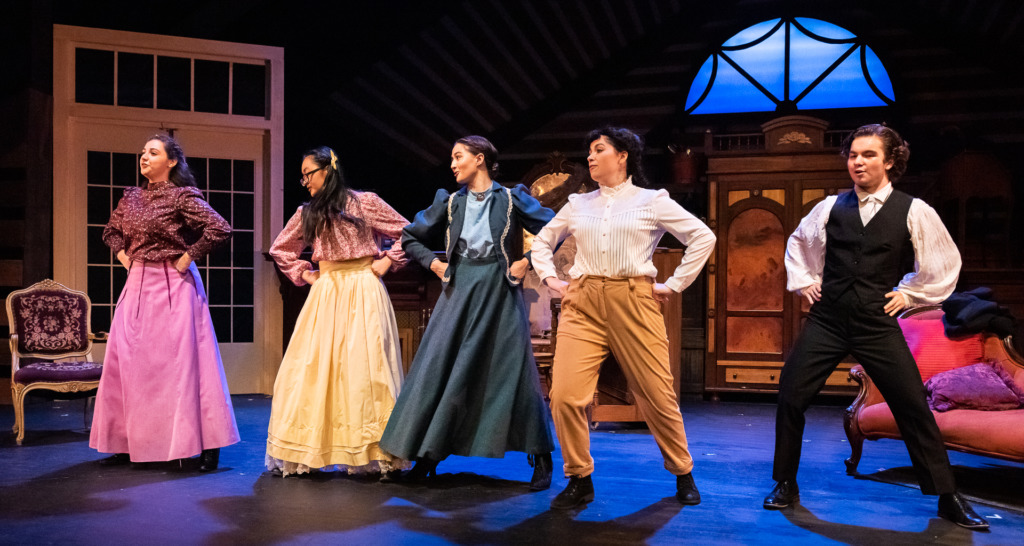
Musical Director Marci Shegogue brings some of the more vexing and complex harmonies of these blended numbers together resplendently. Shegogue also doubles up as the orchestra pit conductor and leads an orchestra (piano- Elizabeth Joy Clark, bass- Brandon Harris, cello- David Zelinsky, horn- Sarah Soisson, percussion- Brian Bera, reed 1- Lindsay Williams, reed 2- Eliana Schenk, trombone- David Cannon, trumpet- David Ottinger, violin- Jaclyn Kitcoff) through these roundabout melodies and fanciful tunes. It is a refreshing delight to hear live music, well-tuned and toned, and keeping pace to the performers on the stage. Shegogue’s seasoned hand in this arm of the performance is much appreciated.
Director and Choreographer Ashleigh King has some fascinating moments that she cultivates during the production, none quite so striking as the moment that’s near the end of the performance during Jo’s big finale-style solo, “The Fire Within Me.” King brings the sisters back to the attic (though all of their lives have drastically changed by this point in the performance) in a recollective memory style scene with each girl wearing the outfit they first appeared in, leaning around Jo’s writing desk as if creating a still-life of her memory. But that’s not all that uncommon. The mesmerizing moment is when Jo takes a seat at the desk, while starting to emotionally belt her face off with true feeling, and the sisters, as well as the other characters who were a part of her life in Concord, physically pull the attic, desk, and Jo away from the main set (it’s a raised dais on wheels) and bring her to the front of the stage, spinning her around until they start spinning around her. It’s astonishing; the visual and emotional impact that moment creates is all-encompassing when it comes to absorbing the story of Little Women.
In addition to this cumulatively striking moment, King keeps the show’s overall pacing zipping along. This show in particular has the penchant of dragging along, has the potential to be well over the three-hour marker, and has the potential of boring your audience to tears if ill-paced. This is not the case at all with King’s approach to pacing. (The show’s just barely over two and a half hours and that includes the intermission!) And while Little Women is not a big, splashy, dance-laden musical in the more traditional sense, King gets to showcase some of her choreographic skillset with a few well-placed jaunts, as well as blocking some of the more melodramatic numbers— like “An Operatic Tragedy” and “The Weekly Volcano Press.” Christopher Columbus! It’s just— astonishing!
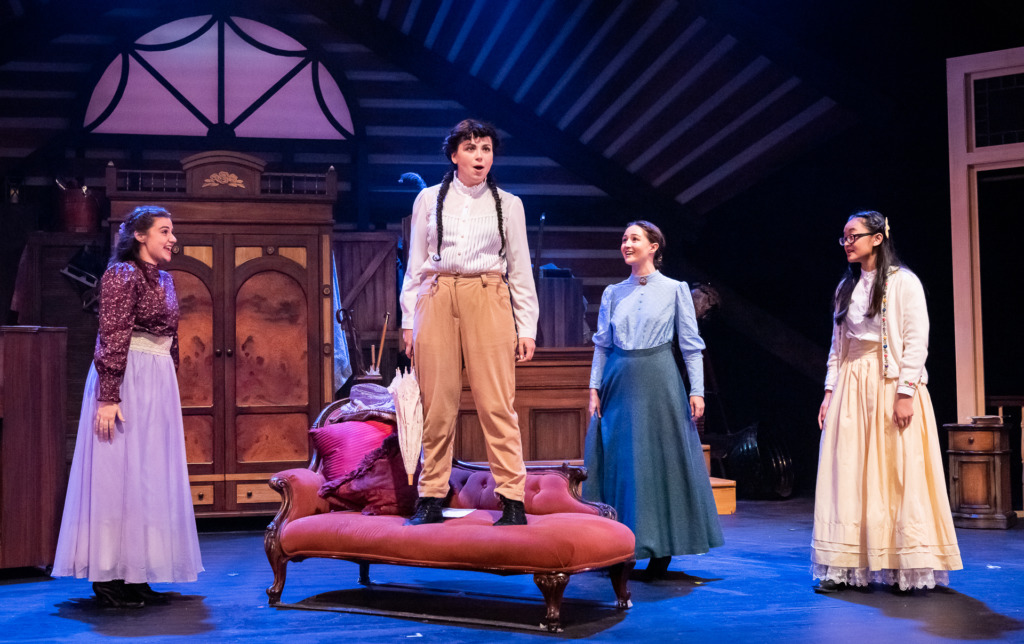
While the majority of the story unfolds in the March household, the show starts off at Mrs. Kirk’s (Julia Ostlund) boarding house. Ostlund, whose character features in the tertiary periphery of the story, is lively in her moments on stage. The boarding house, which is set at the front of the set by carefully placed furnishings, is seen infrequently during the production, though both scenic designer McFadden and lighting designer Joslin give little helping hands to help differentiate this location from the more prominent March household.
The show may be called Little Women but that doesn’t mean there isn’t a place for the men involved. The pinched and meanspirited curmudgeon, Mr. Laurence (Evan Papier) is full of the bitterness of winter (sort of the exact opposite of the joys of springtime) and Papier does a fine job at affecting a elderly, crippling physicality alongside of his bitter demeanor. There’s even a moment of deadpan silence where he just gives a withering glare at one point, which causes the audience to laugh at such a response. Papier’s performance is the polar opposite of Terry Bartlebaugh, playing Mr. Laurence’s grandson, Laurie. Sprightly, joyful, and full of all the spring giddy goodness that a youthful boy should be, Bartlebaugh is quite the refreshing contrast to Papier’s Mr. Laurence. And Bartlebaugh gets quite a few opportunities to showcase his developing vocal talent. “Take a Chance On Me” is giddy and winsome, full of fun. And when he joins in the quintet of “Five Forever” you get that gusto that really bonds him to the March family clan. Of course there’s also “The Most Amazing Thing”, a duet that he shares in the second act with another character (shh. Spoilers.) And this song well-reflects that youthful exuberance somewhat tamed in his maturing existence by this point in the show. Alongside the sophomoric Laurie comes Mr. John Brooke (Solis Pettitt), Laurie’s tutor, who is sweet of face and voice and shows as much during his duet, “More Than I Am”, opposite a different March sister. Pettitt also doubles up as the wicked villain in Jo’s tales and is quite fun to watch in that role.
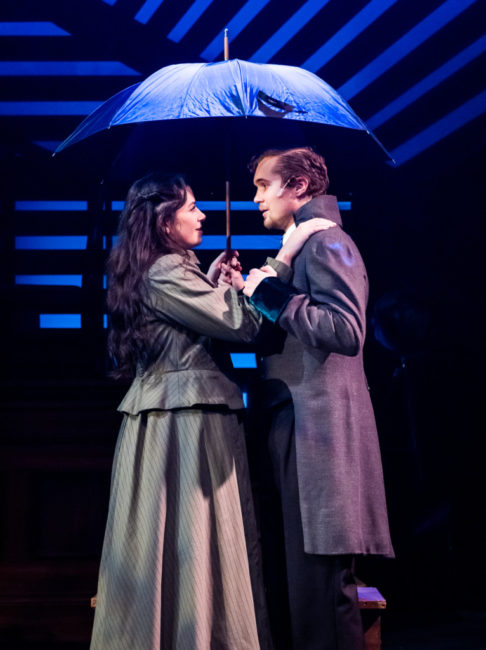
Professor Bhaer (Jimmy Bartlebaugh) is the outlier to the men; the aforementioned trio all come from New England while the good professor is a transplant in New York by way of Germany. Bartlebaugh delivers the character with a subtly affected accent, clearly showcasing his German heritage, but not in a way that obscures his dialogue. What’s more impressive is that he carries this accented affectation into his singing voice. Bartlebaugh is bouncy and full of energy, particularly when leaping into “How I Am” a solo number featured in the second act. As he traverses a full-scale emotional roller coaster in this short number, you get a sense of his deep, emotional connection to the character, as well as his impressive vocal talents.
When it comes to the mature women of the March family there is Marmee (Skye Knight) and Aunt March (Caroline Kinney.) Much like Mr. Laurence and Laurie, these two could not be more opposing in their personalities. While Caroline Kinney portrays the ruthlessly rigid Aunt March, with a frosty exterior and a shrieking sense of superiority, all airs and graces above her station, Skye Knight delivers a sweet, maternal rendering of the Marmee character, who is deeply complex, filled with conflicting emotions. Kinney has a featured duet, opposite Jo, called “Could You” which is a bit of frippery of nonsense in the grander scheme of things, while Knight has two featured solos— “Here Alone” and “Days of Plenty”— both of which are deep and emotionally complex. Both women have solid voices that are well suited for these roles.
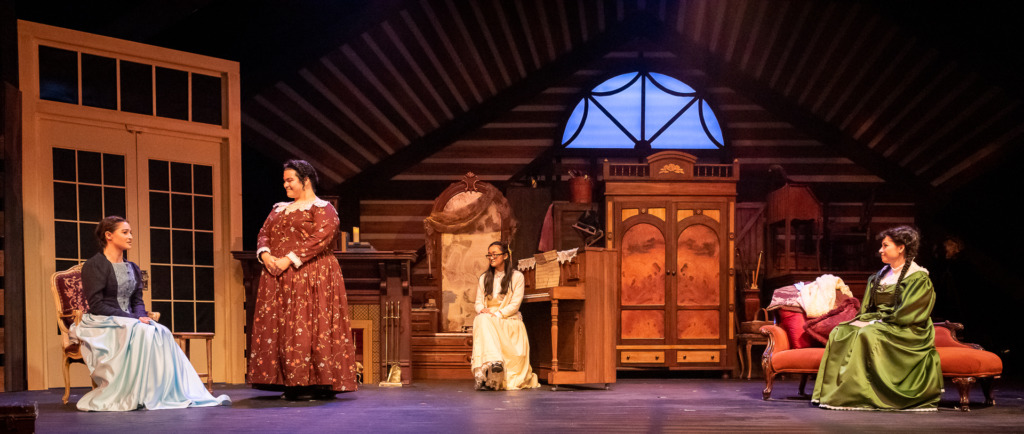
Meg (Abby Altemose) is almost the ‘forgotten March sister’ in this configuration of Little Women, not because Altemose is any less impressive or talented than the three playing her sisters (she’s right on par and has equal footing in the talent arena) but rather because librettist Allen Knee and Lyricist Mindi Dickstein seem to have charged Meg as the “throwaway sister.” If Jo’s the protagonist, Amy an antagonist, and Beth the ameliorant, where does that leave Meg? As the other sister. Despite all this, Altemose has a delightful voice which features in numbers like “Delighted” and later in “More Than I Am.” She has dreamy, doe-eyed moments when it comes to a certain male character too and fits the bill for all of the big blended sounds when the sisters sing together.
A demon in child’s clothing, the perfect descriptor for the Amy character, played with much pluck by Emily Ray. The petulant childishness that radiates out of Ray’s portrayal of the character borders on over-the-top antics, though given that Amy is meant to be the antagonizing and obnoxious youngest of the sisters, it’s a spot-on performance. Ray affects a nasally, whiny sound to her voice, throws little tantrums at the peak of physicality but brings all of that superb brattiness into balance when she takes to singing. She gets to vocally shine during “The Most Amazing Thing.”
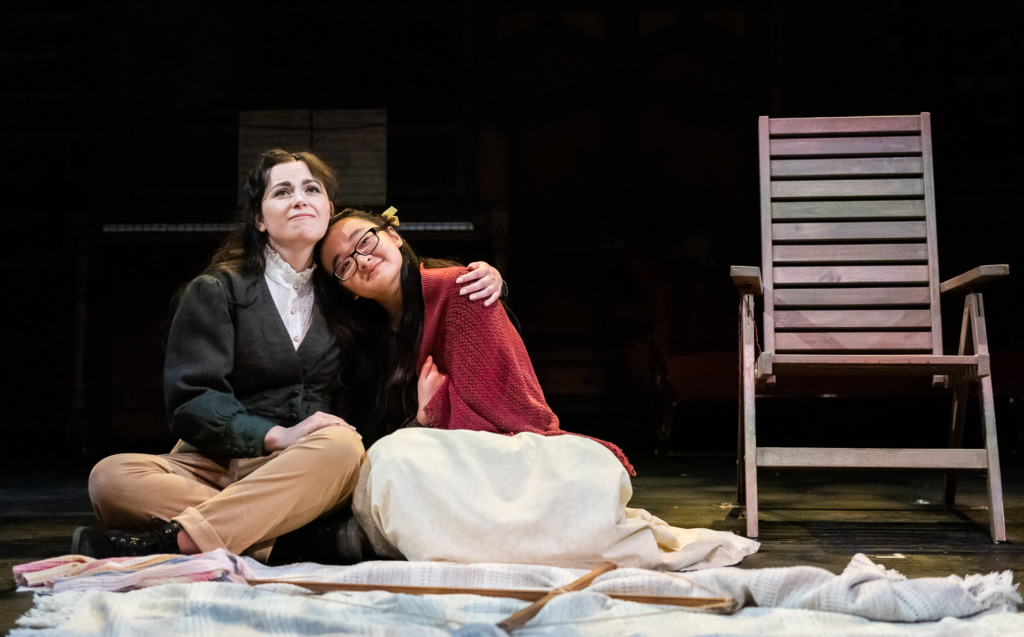
Beth could melt away the clouds. And with Naomi Louie’s winsome nature, the same can be said of the actress in this context. Playing the sweet and mild-mannered peacekeeper of the sisters, Louie’s character often finds herself at the center of the blowups between Jo and Amy. She is calm and quiet, but not in a mousy or meager way. (Whether or not she’s playing the actual piano when Beth starts playing “Off to Massachusetts” is unclear but her fingers are moving with such authentic and practiced precision that either she’s also a skilled pianist or has refined the science of mock-playing astonishingly.) With dulcet tones that just bubble up into the ether, Louie sings sublimely both for “Off to Massachusetts” and well as “Somethings Are Meant To Be” with the latter being a truly bittersweet and evocative tune shared with Jo.
Fiery, fierce, and full of a bombastic nature that cannot be calmed, quashed, crushed, or disheartened, Allison Fitzgerald is the perfect person for the headstrong and heart-hearty role of Jo March. Living and breathing this notion of being astonishing and clinging onto your dreams until they come true in the most extraordinary ways, Fitzgerald is every bit the believable Jo March one could hope for in such a powerful production of Little Women. She’s got an incredible set of pipes that really pack a punch for numbers like “Better” and “Astonishing.” (Everyone knows that number was just trying to be “Defying Gravity” and while it will never be that, Fitzgerald was certainly channeling all of the emotional turmoil and vocal chutzpah of an Elphaba for that Act I Finale number.) Fitzgerald has a striking command of her stage presence, living in each moment fully and really blasting her character’s practically uncontrollable temper all around the set. There are these little moments that Director Ashleigh King has set forth to augment Fitzgerald’s emotional outbursts (mostly in where she physically blocks the character on the multi-leveled stage) and they create these breathtaking moments for the audience to fully embrace. When she emotionally rages through “The Fire Within Me” you can almost feel a full-on conflagration about to burst from within her heart, telling the world her real story.
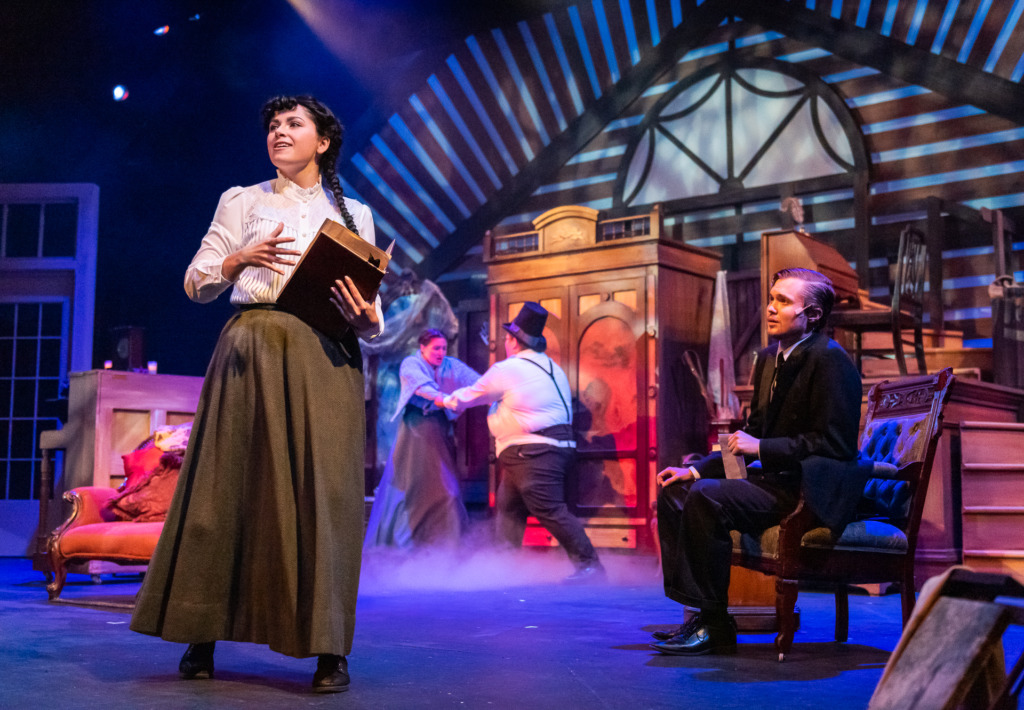
True to the song title’s sake, this production of Little Women at Montgomery College Summer Dinner Theatre is astonishing! It’s loaded with impressive talent, wonderfully creative crew-folk who really create a professional experience on the stage, and there’s even a very impressive dinner option (with plenty of dietary considerations involved in the high-quality catering presented by Metz Culinary Management.) This is one for the books— and not just because its based on a literary classic!
Running Time: 2 hours and 35 minutes with one intermission
Little Women plays through July 31, 2022 at Montgomery College Summer Dinner Theatre— in the Theatre Arts Building of the Rockville Campus of Montgomery College— 51 Mannakee Street in Rockville, MD. For tickets call the box office at (240) 567-5301 or purchase them online.
